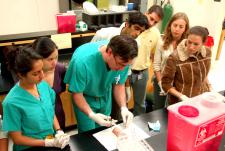Teaching medical students to challenge ‘unscientific’ racial categories
By Ike Swetlitz,
STAT
| 03. 10. 2016
Untitled Document
Medical students looking to score high on their board exams sometimes get a bit of uncomfortable advice: Embrace racial stereotypes.
“You see ‘African American,’ automatically just circle ‘sickle cell,’” said Nermine Abdelwahab, a first-year student at the University of Minnesota Medical School, recounting tips she’s heard from older classmates describing the “sad reality” of the tests.
Medical school curricula traditionally leave little room for nuanced discussions about the impact of race and racism on health, physicians and sociologists say. Instead, students learn to see race as a diagnostic shortcut, as lectures, textbooks, and scientific journal articles divide patients by racial categories, reinforcing the idea that race is biological. That mind-set can lead to misdiagnoses, such as treating sickle cell anemia as a largely “black” disease.
Read more...
Image via Wikimedia.
Related Articles
By Arthur Lazarus, MedPage Today | 01.23.2026
A growing body of contemporary research and reporting exposes how old ideas can find new life when repurposed within modern systems of medicine, technology, and public policy. Over the last decade, several trends have converged:
- The rise of polygenic scoring...
By Stephanie Pappas, LiveScience | 01.15.2026
Genetic variants believed to cause blindness in nearly everyone who carries them actually lead to vision loss less than 30% of the time, new research finds.
The study challenges the concept of Mendelian diseases, or diseases and disorders attributed to...
By David Cox, Wired | 01.05.2026
As he addressed an audience of virologists from China, Australia, and Singapore at October’s Pandemic Research Alliance Symposium, Wei Zhao introduced an eye-catching idea.
The gene-editing technology Crispr is best known for delivering groundbreaking new therapies for rare diseases, tweaking...
By Josie Ensor, The Times | 12.09.2025
A fertility start-up that promises to screen embryos to give would-be parents their “best baby” has come under fire for a “misuse of science”.
Nucleus Genomics describes its mission as “IVF for genetic optimisation”, offering advanced embryo testing that allows...




